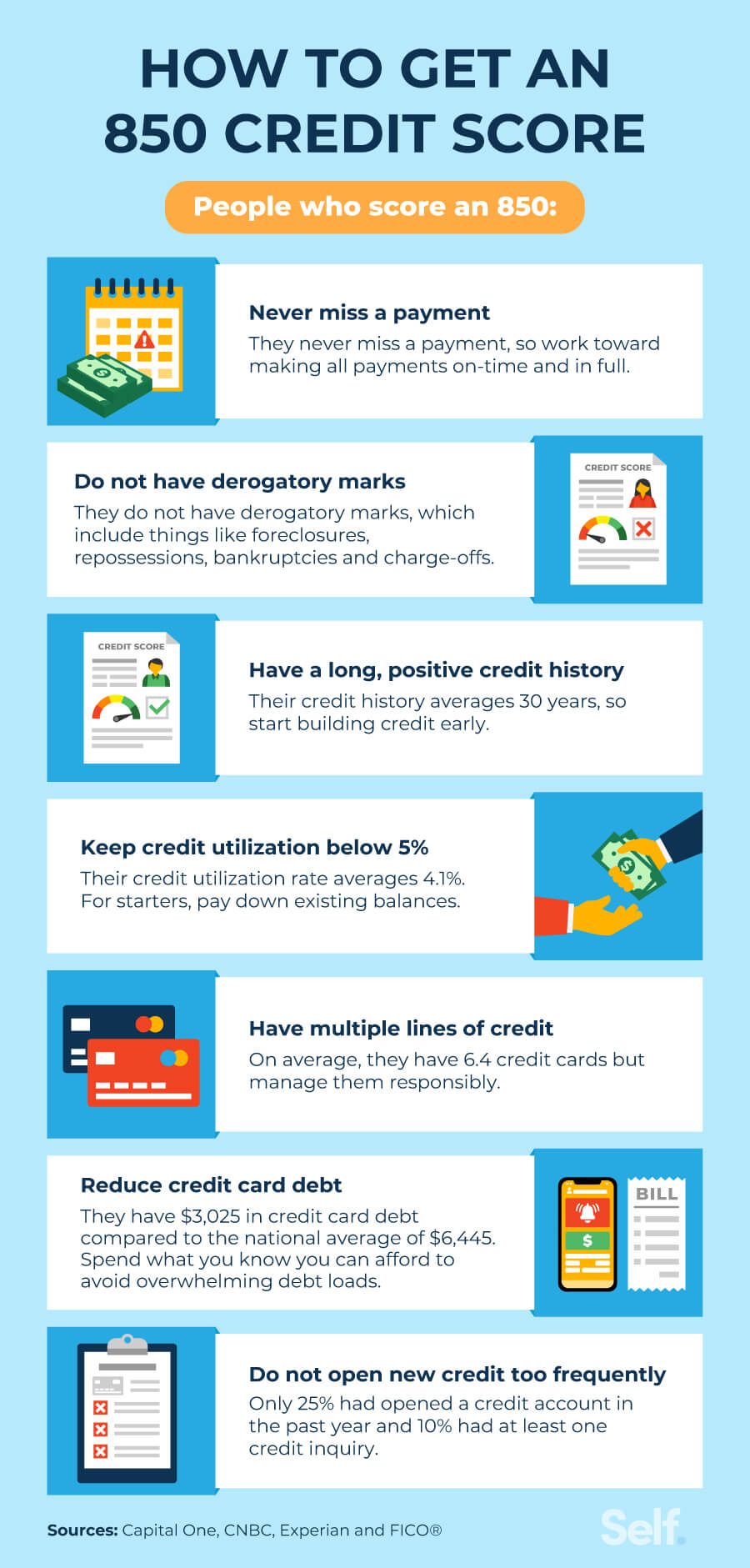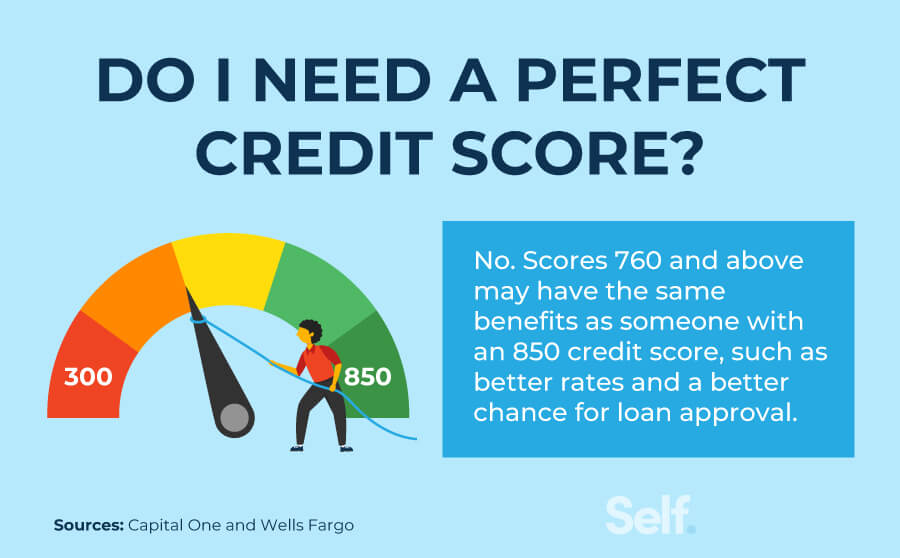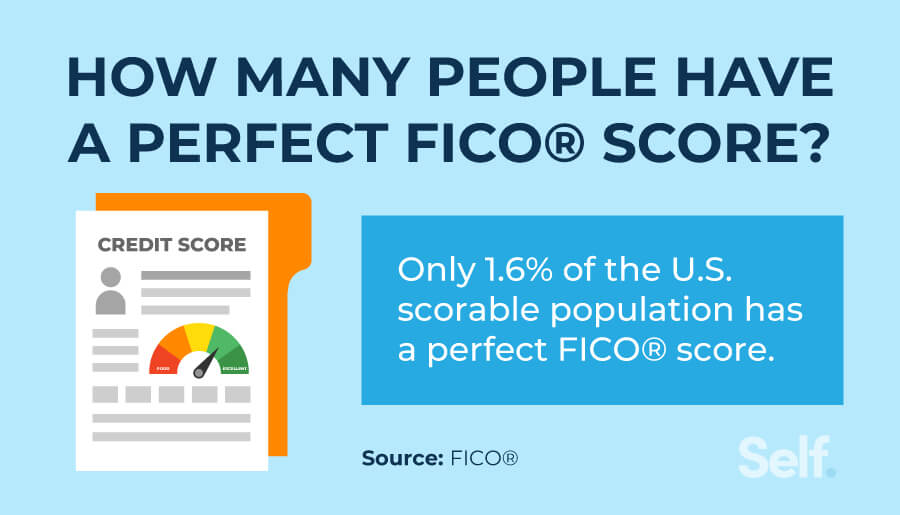How to Get an 850 Credit Score
Published on: 09/06/2022
Although you can achieve an 850 credit score, which both major credit scoring models consider to be perfect,[1] according to FICO ® as of April 2019 only 1.6% of the scorable population has achieved that milestone. However, you don’t need an 850 to have excellent credit.[2]
The FICO® scale separates scores into five ranges, and in 2021, FICO® reported that the average credit score in the U.S. was 716, which falls into the range of “good”[3]. While you may want a perfect credit score, an exceptional score — between 800 and 850 — typically allows you the same benefits as a perfect score.[4]
Building a perfect score takes time, and your score can fluctuate based on several factors. So this post explains how a perfect credit score requires on-time payments, low balances, a good mix of credit and few hard inquiries over time.

Never miss a payment
The FICO® model considers your payment history to be the most important factor in determining your credit score — it accounts for 35% of your overall score.[5] Payment history impacts your VantageScore 3.0 number even more, at 40%.[6]
People who have achieved the highest credit score possible do not have a credit history that includes missed payments, collection accounts or other negative information.[2] Because these factors influence your payment history, you may be able to positively impact your credit score by following steps that keep your payments on track:
- Sign up for automatic bill pay: You may avoid late payments by setting up automatic bill pay from your bank account. Select a date before your payment is due each month to help guard against payments arriving late.[7]
- Sign up for email or text reminders: Signing up for reminders from your financial institution about upcoming due dates may help you get your bill paid on time.
- Create your own reminders: You can set up just one reminder on your phone’s calendar for each bill, and as long as you set it as recurring, it pops up each month at the same time to remind you of monthly bills. If you prefer writing it on a calendar, write it down just as you would an important appointment or event that you don’t want to miss.
- Pay down your debt: Late payments and underpayments can negatively impact your credit score. If you can pay down the debt you currently have, you can help make payments more manageable so you don’t miss a payment.
Avoid derogatory marks
Perfect scorers have no derogatory marks on their credit history.[2] Derogatory marks can come in several forms and generally refer to negative items on your payment history, which accounts for 35% of your FICO® score and 40% of your VantageScore 3.0.[5], [6]
Knowing what credit bureaus refer to as derogatory marks may help you to avoid them:
- Late or nonpayments: Typically, any payments 30 days or more past due show up as late on your credit report.
- Foreclosures: Foreclosures occur when mortgage lenders take possession of real estate property from borrowers who have failed to make payments.
- Repossessions: If you stop paying on installment loans secured by personal property, such as a car, the creditor may repossess that property.
- Bankruptcies: When you file for bankruptcy protection, it appears as a negative mark on your credit report and the bankruptcy remains on your report for 7 years under a Chapter 13 case and 10 years for a Chapter 7 case.[8]
- Charge-offs: A charge-off occurs when a creditor stops trying to collect on a debt and typically sells it to a debt collection agency, generally once you’re 180 days past due.
[9]
You can avoid these derogatory marks simply by making your payments on time. Maintaining low debt balances may make your debt manageable so that you can keep up with payments. Be proactive with your credit. If you think you may be late on a payment, try contacting your creditors to see if they can work with you to help you get back on track.[10]
Have a long, positive credit history
Maintaining a positive credit history over an extended period factors heavily in achieving an excellent or even perfect credit score. The age of your credit history counts for 15% of your FICO® score calculation[5] and for 21% under the VantageScore 3.0 model.[6]
People with perfect credit history tend to keep their credit accounts open, on average, for nearly 11 years.[11] On top of this, the average age of their oldest account, open or closed, is 30 years.[2]
If you haven’t already established credit, doing so as soon as possible can get you on the road toward building a long, positive credit history. By maintaining low balances, managing your debt and making on-time payments over a period of several years, you can further build a healthy credit history.
Keep credit utilization below 5%
Keeping your credit utilization rate (CUR) low can impact your credit score positively. Credit utilization, also known as “amounts owed,” accounts for 30% of your FICO® score — second in importance only to your payment history[5] — and for 20% of your VantageScore.[6]
While the average revolving credit utilization for those with an 850 score is 4.1%[2], experts suggest that keeping your credit utilization at or below 10% may put you in a position for excellent credit and staying under 30% may still place you in a “good” credit category.[12]
You can calculate your credit utilization ratio by dividing the amount you owe by your credit limit — the maximum amount you can borrow. For example, if you had a spending limit of $3,000 and a balance of $300, your CUR would be 10%. You can calculate your CUR for each individual account you have open or by combining the amounts into one calculation.
Because your balance and your available credit factor into the calculation, your credit limit can affect your CUR, not just the balance you owe. The same balance in the example above ($300) doubles the CUR if the credit limit is $1,500 — the credit utilization rate becomes 20%.
You can lower your credit utilization by doing things like paying down balances (even making two payments a month), requesting credit limit increases, and keeping revolving accounts open even if you do not use them frequently.[13]
Have multiple lines of credit
The more kinds of credit you have (auto loans, personal loans, installment loans, credit card accounts, student loans, and so on), the better your credit mix may be, which accounts for 10% of your FICO score[5] and 21% for the VantageScore 3.0 model.[6]
People with perfect credit have more open lines of credit than those with average credit scores, and they typically have 6.4 credit cards on average, compared with the national average of 3.8.[4]
However, those perfect scorers use their credit responsibly and carry less debt than average scorers.[4]
You might be able to keep open more lines of credit and build a better credit score as long as you also follow some tips:
- Budget effectively. Know what debt you currently carry and make sure you can make on-time payments or pay debts off before you consider opening new accounts with new debt.
- Keep your credit use low. If you open new accounts, use them sparingly and try to pay the balance off each month so that you’re adding new credit but not new debt.
- Open new accounts selectively. Sometimes you need to open a new credit account, especially for a large purchase. Consider what you need in terms of credit and how it affects your overall budget so that you don’t take on too much debt at once.
Reduce credit card debt
Having high credit limits helps you build a better credit score as long as you keep your debt low. Even though individuals with perfect credit scores had an average of 6.4 credit cards, more than average scorers, they had less credit card debt. Perfect scorers had an average credit card debt of $3,025 compared with the national average of $6,445 — over twice as much debt as individuals with perfect credit scores.[4]
Reducing your credit card debt while keeping accounts open may give you a better credit utilization rating, which accounts for 20% to 30% of your credit score, depending on the model.[5], [6] You can try a number of ways to reduce your debt.
- Budget carefully.
- Pay beyond the minimum balance on your credit cards.
- Explore the debt avalanche method: Apply more money to debt with the highest interest rates while paying the minimum amount on lower-interest accounts.
- Use the debt snowball strategy. Pay off the smallest debt first, then roll the money you were paying on that into the next-smallest debt while continuing to make minimum payments on the rest.
Do not open new credit too frequently
While people with perfect credit scores have more credit card accounts than average, they don’t open new accounts frequently. In fact, only 10% of them had one or more inquiries in the past year, and about one-quarter had opened one or more credit accounts in the past year.[2]
Opening or applying for too many new lines of credit in a short period of time can negatively impact your credit score. Every application counts as a “hard” credit inquiry [14] For this reason, consider opening new lines of credit (or making credit inquiries) only when absolutely necessary and beneficial to your financial goals.
However, you don’t need to worry about soft inquiries, such as checking your own credit, allowing prospective employers to do so if you’re applying for a job or checks by credit card issuers seeking to preapprove you in an effort to get your business. Soft inquiries do not deduct any points from your credit score.

Do you need a perfect credit score?
Since most lenders don’t differentiate between a perfect score and an excellent score (above 800) when making decisions on loan approval, you don’t need a perfect credit score. In fact, even with the average credit score of 716, you would have “good” credit and may receive loan approval like those with very good or excellent credit.[3]
The benefits of having good credit can make a big difference in your personal finance. You may receive:
- Better rates on insurance
- Lower credit card interest rates
- Eligibility for higher credit limits
- Higher approval chances increase for all loan types
[15]
To achieve and maintain very good or excellent credit, try to significantly reduce (or eliminate altogether) negative credit items, carry minimal debt, and work toward having a long and positive credit history filled with on-time payments.

Improve your credit
You don’t have to have perfect credit to get good terms from credit card companies or for other financial products. However, maintaining a healthy credit profile means being aware of your credit score and knowing how to improve it. Bad credit can cost you money in the form of higher interest rates and missing out on credit and loan opportunities if your applications are declined. Understanding how to build your credit can add to your financial security and open up a world of possibilities in the future.
Sources
- Equifax. “What is a Good Credit Score?” https://www.equifax.com/personal/education/credit/score/what-is-a-good-credit-score/. Accessed on May 17, 2022.
- FICO. “The Perfect Credit Score: Understanding the 850 FICO Score,” https://www.fico.com/blogs/perfect-credit-score-understanding-850-fico-score. Accessed on May 17, 2022.
- FICO. “Average U.S. FICO® Score at 716, Indicating Improvement in Consumer Credit Behaviors Despite Pandemic,” https://www.fico.com/blogs/average-us-ficor-score-716-indicating-improvement-consumer-credit-behaviors-despite-pandemic. Accessed on May 18, 2022.
- Experian. “The Elusive 850: Experian Reveals Traits of Consumers With Perfect FICO® Scores,” https://www.experian.com/blogs/ask-experian/perfect-scores-who-has-them-and-what-do-they-have-in-common/. Accessed on May 18, 2022.
- MyFICO. “What's in my FICO® Scores?” https://www.myfico.com/credit-education/whats-in-your-credit-score. Accessed on May 18, 2022.
- Forbes. “What is a VantageScore?” https://www.forbes.com/advisor/credit-score/what-is-vantagescore/. Accessed on May 18, 2022.
- Experian. “How to Avoid Late Payments and Protect Your Credit,” https://www.experian.com/blogs/ask-experian/how-to-avoid-late-payments/. Accessed on May 18, 2022.
- CNBC. “Filing for bankruptcy can cause a good credit score to drop at least 200 points – here’s what you should know,” https://www.cnbc.com/select/how-long-do-bankruptcies-stay-on-credit-report/. Accessed on June 23, 2022.
- Capital One. “Derogatory Marks on Credit Reports,” https://www.capitalone.com/learn-grow/money-management/derogatory-credit/. Accessed on May 18, 2022.
- Capital One. “How Long Do Late Payments Stay on Credit Reports?” https://www.capitalone.com/learn-grow/money-management/how-long-do-late-payments-stay-on-your-credit-report/. Accessed May 24, 2022.
- FICO. “FICO® Score High Achievers: Is Age the Only Factor?” https://www.fico.com/blogs/ficor-score-high-achievers-age-only-factor. Accessed on May 18, 2022.
- CNBC. “Does a $0 balance on your credit card make your score go up?” https://www.cnbc.com/select/what-is-a-good-credit-utilization-ratio/. Accessed on May 18, 2022.
- Experian. “Five Ways to Keep Your Credit Utilization Low,” https://www.experian.com/blogs/ask-experian/ways-to-keep-credit-utilization-low/. Accessed on May 18, 2022.
- Experian. “How Many Points Does an Inquiry Drop Your Credit Score?” https://www.experian.com/blogs/ask-experian/how-many-points-does-an-inquiry-drop-your-credit-score/. Accessed on May 18, 2022.
- Capital One. “8 Benefits of Having a Good Credit Score,” https://www.capitalone.com/learn-grow/money-management/benefits-of-high-credit-score/. Accessed on May 18, 2022.
About the author
Ana Gonzalez-Ribeiro, MBA, AFC® is an Accredited Financial Counselor® and a Bilingual Personal Finance Writer and Educator dedicated to helping populations that need financial literacy and counseling. Her informative articles have been published in various news outlets and websites including Huffington Post, Fidelity, Fox Business News, MSN and Yahoo Finance. She also founded the personal financial and motivational site www.AcetheJourney.com and translated into Spanish the book, Financial Advice for Blue Collar America by Kathryn B. Hauer, CFP. Ana teaches Spanish or English personal finance courses on behalf of the W!SE (Working In Support of Education) program has taught workshops for nonprofits in NYC.
Editorial policy
Our goal at Self is to provide readers with current and unbiased information on credit, financial health, and related topics. This content is based on research and other related articles from trusted sources. All content at Self is written by experienced contributors in the finance industry and reviewed by an accredited person(s).
